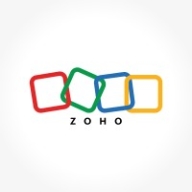

Zoho Creator and Microsoft Power Apps compete in the application development space, particularly in providing low-code/no-code solutions. Based on the comparison, Zoho Creator seems to have an edge in customization and integration, while Microsoft Power Apps excels in seamless integration within the Microsoft ecosystem.
Features: Zoho Creator prioritizes customization with support for HTML, CSS, and Deluge scripting, enabling rapid prototyping and integration with Zoho's CRM and third-party applications. It is highly flexible for developing applications in complex environments, allowing for custom scripting and workflow creation. Microsoft Power Apps is versatile in integrating with various Microsoft products like Azure, Teams, and Dynamics 365 and offers rapid app development with its low-code platform. It is aimed at making app creation accessible to non-programmers, facilitating connections with Office products and cloud services for streamlined operations.
Room for Improvement: Zoho Creator needs enhancements in the user interface, better support for extensive forms, and improved AI capabilities. The limitations in API call durations and high customer portal costs also need attention. Microsoft Power Apps needs better integration with non-Microsoft platforms, a simplified licensing model, and enhanced support for handling large data sets. The challenges with external database connections hinder its full potential.
Ease of Deployment and Customer Service: Zoho Creator offers deployment across public, private, and hybrid clouds, which provides flexibility in platform choice. However, its customer service sometimes receives mixed reviews regarding speed and effectiveness. Microsoft Power Apps, primarily deployed on public clouds, benefits from Microsoft's extensive support infrastructure, generally offering more responsive and comprehensive customer service.
Pricing and ROI: Zoho Creator provides competitive subscription-based pricing with various tiers, particularly beneficial in bundled Zoho packages for scalable solutions. Microsoft Power Apps is perceived as slightly more costly due to its integration with other Microsoft services. However, it offers good value within the Microsoft ecosystem, especially for businesses deeply invested in Microsoft technologies. Both platforms demonstrate significant ROI, with Zoho Creator notably offering substantial cost savings when compared to competitors like Salesforce.
The connection between Power Apps and Power BI simplifies generating and presenting reports, alleviating the workload and enhancing productivity.
The aim is to create a cleaner interface to replace spreadsheets, thus standardizing processes and improving efficiency.
For instance, a company I worked with compared spending on Salesforce, which was 15 crore, to our expenses with Zoho Creator, which was only 2 crore annually.
I have seen a return on investment with Zoho Creator because we eliminated a point of sale software that was charging us 5 lakhs per year across all 26 malls.
Using Zoho Creator is affordable for my business as it helps save time.
They are probably adequate for pretty vanilla type of requirements or support tickets, but when it actually comes to something in-depth, I would not rate them more than six or seven, maximum seven.
Their assistance was crucial as we developed the solutions.
Community support is closer to an eight or nine since there's a big enough community that someone has likely faced the same problem and posted about it, improving the community overall.
I would rate the technical support 10 out of 10 because they provide excellent assistance.
Delays arise once the support team must refer to backend processes or developers, highlighting the need for enhancement in their overall support system.
All documentation exists, detailing even the smallest elements; by reading through it properly, one can manage without additional support.
If it is flexible and includes premium connectors, scalability is easy.
It is quite scalable, though there are some limitations regarding the number of records.
Being browser-based allows me to drag and drop components immediately, deploying in seconds on a live application.
We are continuing to build on top of what was initially created for them, ensuring that scalability is never an issue as long as you understand how to utilize Zoho properly.
When my customers' needs are growing, Zoho Creator is able to adapt to these growing needs because it's a build-it-yourself application.
I have not really seen any performance issues, slowness, or response time.
I would rate the stability of Microsoft Power Apps as a nine out of ten.
The core elements of coding and daily scripting remain unchanged despite interface updates, assuring continuity in my work.
You can't rely on any software in business if it's not going to be stable and reliable.
Offering versatile flexibility for various integrations, such as WhatsApp and email API integration.
This would assist business process users who lack coding knowledge.
These tools should be intuitive for business users who will need at least a week of training to use them effectively.
In many use cases, applications might require importing data exceeding two thousand records, potentially reaching one hundred thousand.
In terms of scalability, there are certain limitations if the data volume is large due to execution limits.
Enhancing the user interface could also be beneficial, as the company's focus seems more on functionality.
I want to see improvements in Zoho Creator focusing on AI capabilities because there currently seems to be very little AI usage in Zoho compared to the advancements in other software.
For small to medium enterprises, it is affordable, especially with Microsoft Enterprise licensing.
For more elaborate work, an upgrade to an enterprise license, costing around $35 per license, is needed.
It is in the middle range and considered reasonable given the current price.
Zoho offers customizable pricing options, such as Zoho One, which provides access to all 40 applications for 1250.
For INR, the standard cost is 480 per month, the professional tier is around 1,200, and the enterprise level is 1,500, based on the subscription level per user for Zoho Creator.
Pricing is a little on the higher side for the Indian market, especially for mid-sized and small-sized companies with 30 to 40 users.
It integrates seamlessly with Power Automate for process automation and connects with email, SharePoint, Power BI, and MS Teams, facilitating everyday processes.
Canvas Apps provide complete user design flexibility with many connectors to integrate into Microsoft Power Apps, making it efficient to fetch and update information from various data sources such as Dataverse, Excel, SharePoint, and Azure.
I run a couple of SQL Servers, which are premium connectors in Microsoft Power Apps, and that requires a different licensing model than what a standard E5 license covers.
The seamless integration with third-party applications and services in Zoho Creator greatly enhances its utility in my business environment, as the ease of integration is impressive.
For analytics, we employ two tools: Zoho Creator itself and Zoho Analytics, where we can use SQL queries to fetch data from multiple platforms.
We can generate QR codes for free, whereas in CRM, QR generation requires external purchases.
| Product | Market Share (%) |
|---|---|
| Microsoft Power Apps | 9.9% |
| Zoho Creator | 1.3% |
| Other | 88.8% |

| Company Size | Count |
|---|---|
| Small Business | 31 |
| Midsize Enterprise | 17 |
| Large Enterprise | 50 |
| Company Size | Count |
|---|---|
| Small Business | 22 |
| Midsize Enterprise | 4 |
| Large Enterprise | 7 |
Microsoft Power Apps is a rapid application development software and low-code development platform. The solution consists of a suite of apps, services, connectors, and a data platform. It provides an environment for building custom apps which is suitable for different businesses.
Microsoft Power Apps allows users to not only build applications, but also connect them to Microsoft's other sources, including the underlying data platform Microsoft Dataverse, as well as online and on-premise sources such as SharePoint, Dynamics 365, and Microsoft 365. The applications built using Microsoft Power Apps have a responsive design that makes them suitable for work in browsers and on mobile applications on different devices.
The no-code side of the product makes it suitable for complete beginners to app building, allowing them to easily create fully functional applications with many features. The solution also has a specialized platform for developers where specialists can access data and metadata, create custom connectors, integrate with external data, and apply business logic. The solution allows users to create three types of apps: canvas, model-driven, and portal. They are made using:
Microsoft Power Apps Features
The three different design tools of the solution, Power Apps Studio, App Designer, and Power Apps Portals Studio, come with various features which allow users to utilize the tools. Some of these features include:
Microsoft Power Apps Benefits
The product brings various benefits to organizations and individuals who utilize it. Some of the biggest advantages of Microsoft Power Apps include:
Reviews from Real Users
An IT Specialist (INFOSEC) at a government appreciates this tool because it is low-code, low learning curve, and reduces manpower.
Rafael T., a data engineer at NTT Security, likes Microsoft Power Apps, because it is great for making apps quickly, has helpful support, and integrates with Power BI.
Zoho Creator is a web-based platform that lets everyone build custom business applications without any prior technical knowledge
Zoho Creator offers a first of its kind drag-n-drop interface to create tables/forms, design, schedule workflows and perform a variety of automated actions.
Zoho Creator's powerful tools for data collection and management, analysis, reporting and collaboration make it the smart choice for small to large organizations to run their business online, without any additional costs, infrastructure, or software.
Zoho Creator is used by more than 400,000 users and 100,000+ apps have been already created. Don't let complex looking workflows and business rules scare you.
Zoho Creator is completely non-programmer friendly. Use the intuitive and feature-rich platform to build your custom database applications. Just write your business rules and let the software handle deployment and hosting. You can create your own forms/tables afresh or import data from standard formats (.xls .csv .mdb) and get your database application online within minutes, really!
We monitor all Rapid Application Development Software reviews to prevent fraudulent reviews and keep review quality high. We do not post reviews by company employees or direct competitors. We validate each review for authenticity via cross-reference with LinkedIn, and personal follow-up with the reviewer when necessary.